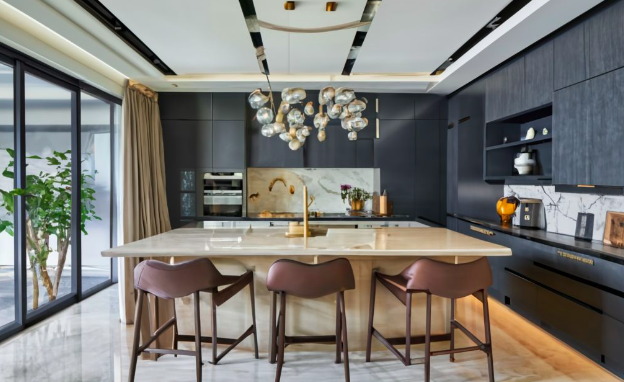As our understanding of environmental conservation deepens, sustainable and eco-friendly practices have become increasingly important in all aspects of our lives. This includes the design of our living spaces, including the heart of the home – the kitchen. In this article, we will explore the concept of sustainable and eco-friendly kitchen design and how it can be tailored to modern Singaporean homes.
In This Article
ToggleSustainable kitchen design involves making conscious choices that minimize the impact on the environment, while still providing a functional and aesthetically pleasing space for cooking and dining. From the materials used to the appliances installed, every element can be selected with sustainability in mind.

When it comes to eco-friendly kitchen design, Singaporean homes can benefit greatly. With limited space and resources, adopting sustainable practices can help create a greener and more efficient culinary space. Not only does it contribute to a healthier planet, but it also enhances the overall cooking experience and promotes a sustainable lifestyle.
In the following sections, we will explore the benefits of sustainable and eco-friendly kitchen design, offering insights into how these practices can bring positive change to your home. We will also provide practical tips and ideas for incorporating sustainable practices into your kitchen design, including eco-friendly materials and energy-efficient appliances.
Key Takeaways:
- Sustainable kitchen design focuses on minimizing environmental impact while maintaining functionality and style.
- Eco-friendly kitchen design practices can be tailored to the unique needs and constraints of Singaporean homes.
- Adopting sustainable practices in the kitchen offers numerous benefits, including waste reduction and energy conservation.
- Choosing eco-friendly materials and appliances contributes to a greener lifestyle and healthier planet.
- Practical tips and ideas will be provided to help you incorporate sustainable practices into your kitchen design.
How can I renovate my home without having to spend all my time and energy on it?
Benefits of Sustainable and Eco-Friendly Kitchen Design
Adopting sustainable and eco-friendly kitchen design practices not only benefits the environment but also enhances your overall culinary experience. Here, we will explore the numerous advantages that come with making conscious design choices for your kitchen.
Reduced Waste
One of the significant benefits of sustainable kitchen design is the reduction in waste generation. By implementing proper waste management systems, such as composting and recycling facilities, you can minimize the amount of organic and non-organic waste that goes to landfills. This not only helps to protect the environment but also promotes a healthier and cleaner living space.
Energy Conservation
Creating an eco-friendly kitchen design allows for the integration of energy-saving practices. Incorporating energy-efficient appliances, like induction cooktops and LED lighting, can significantly reduce your energy consumption. Additionally, maximizing natural lighting and ventilation can further decrease your reliance on artificial lighting and ventilation systems, leading to lower energy bills and a smaller carbon footprint.
Minimized Carbon Footprint
By embracing sustainable practices in kitchen design, you actively contribute to reducing your carbon footprint. Choosing eco-friendly materials, such as bamboo or reclaimed wood, for cabinets, flooring, and countertops helps preserve natural resources while minimizing the emissions associated with the manufacturing and disposal of conventional materials. Additionally, opting for energy-efficient appliances and water-saving fixtures further reduces your greenhouse gas emissions and environmental impact.
Eco-Friendly Materials and Appliances
When designing a sustainable kitchen, you have a wide range of eco-friendly materials and appliances to choose from. Utilizing renewable materials, such as recycled glass countertops and cork flooring, not only adds a unique aesthetic to your kitchen but also supports sustainability efforts. Investing in energy-efficient appliances, such as refrigerators and dishwashers with ENERGY STAR ratings, not only saves energy but also ensures optimal functionality and longevity.
Incorporating sustainable and eco-friendly kitchen design practices offers a multitude of benefits, from waste reduction and energy conservation to minimizing your carbon footprint. By making conscious choices in material selection and appliance usage, you can create a kitchen that aligns with your eco-conscious lifestyle without compromising on style or functionality.

Incorporating Sustainable Practices in Kitchen Design
Creating an eco-friendly and sustainable kitchen goes beyond just aesthetics. It involves thoughtful decisions and conscious choices when selecting materials, appliances, and solutions. By incorporating sustainable practices in your kitchen design, you can contribute to a greener lifestyle and reduce your environmental impact. Here are some practical tips and ideas to help you achieve that:
1. Sustainable Kitchen Materials
Opt for sustainable and renewable materials in your kitchen design. Consider using bamboo for flooring and cabinetry, as it is a fast-growing, renewable resource. Reclaimed wood is another excellent option for countertops and shelving, giving your kitchen a unique character while reducing waste. Choose recycled countertops made from materials like glass or quartz, which provide durability and sustainability.
2. Energy-Efficient Kitchen Appliances
Energy-efficient appliances are essential for sustainable kitchen design. Look for appliances that have an Energy Star label, indicating that they meet strict energy efficiency standards. Replace old and inefficient appliances with newer models that consume less energy. Consider investing in induction cooktops as they use less energy and offer precise temperature control. Additionally, choose low-energy-consumption refrigerators and dishwashers, which have a significant impact on overall energy usage in the kitchen.
3. Water-Saving Fixtures
Minimize water wastage by incorporating water-saving fixtures in your kitchen design. Install low-flow faucets and aerators, which reduce water consumption without compromising water pressure. Consider using a dual-flush toilet to save water in the kitchen’s adjacent bathroom. Implementing these small changes can lead to significant water conservation over time.
4. Smart Home Technologies
Integrate smart home technologies into your kitchen design for efficient resource management. Use smart thermostats to regulate heating and cooling, ensuring energy is used only when necessary. Install smart lighting systems with motion sensors that automatically turn off lights in unoccupied areas. Smart appliances equipped with energy-saving modes can help optimize energy consumption. Additionally, consider utilizing smart home assistants to control and monitor your kitchen’s energy usage remotely.
By incorporating sustainable practices into your kitchen design, you can create an eco-friendly culinary space that aligns with your values and lifestyle. Choosing sustainable materials, energy-efficient appliances, water-saving fixtures, and smart home technologies will not only reduce your carbon footprint but also contribute to a healthier planet. Start transforming your kitchen today and embrace a greener and more sustainable way of living.

Conclusion
In conclusion, embracing sustainable and eco-friendly kitchen design is not just a trend but a responsible choice for the future. By making conscious design decisions and opting for sustainable materials and appliances, you can create a culinary space that minimizes environmental impact while enhancing your overall cooking experience.
With the wealth of options available, it’s easier than ever to transform your kitchen into an eco-friendly haven without compromising on style or functionality. Incorporating sustainable practices such as using natural and renewable materials like bamboo, reclaimed wood, and recycled countertops can significantly reduce your kitchen’s carbon footprint.

Additionally, investing in energy-efficient appliances, water-saving fixtures, and smart home technologies can help conserve resources and lower utility bills. These eco-friendly choices not only benefit the environment but also contribute to a healthier and more sustainable lifestyle for you and your family.
Start your journey towards a greener kitchen today. Take a step towards sustainability by considering sustainable and eco-friendly design principles when planning your kitchen remodel or renovation. With a mindful approach, you can create a beautiful and functional kitchen space while reducing your impact on the planet.
